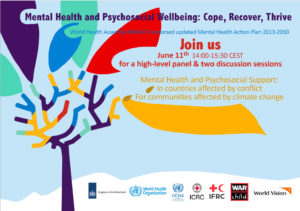
- This event has passed.
Mental Health and Psychosocial Wellbeing: Cope,Recover, Thrive
World Health Assembly #WHA74 endorsed the updated Mental Health Action Plan 2013-2030. Many Member States and organizations spoke out on the importance of mental health. National health authorities and multilateral organizations alike are increasingly acknowledging that investing in mental health and psychosocial support is key for strengthening individual and collective resilience and ability to recover and thrive, in times of crisis as well as in national development and health strategies.
This event, co-hosted by IFRC, War Child & World Vision, and the Kingdom of the Netherlands, will provide a platform to further explore possibilities to act on the resolve to increase access to mental health and psychosocial support worldwide.
The event starts with a 45 minutes high-level panel with the participation of, among others:
- Ms Julieth Pacheco, Youth Advocate from Colombia
- Mr Mark Lowcock, Under-Secretary-General for Humanitarian Affairs and Emergency Relief Coordinator, OCHA
- Dr Jagan Chapagain, Secretary General of the International Federation of Red Cross and Red Crescent Societies (IFRC)
- Mr Robert Mardini, Director General, International Committee of the Red Cross (ICRC)
- Dr Ren Minghui, Assistant Director-General, Universal Health Coverage, Communicable and Noncommunicable Diseases, WHO
- Mr Ramin Shahzamani, Chief Executive Officer War Child Holland
This panel will be followed by two separate, parallel sessions:
Session A
hosted by War Child Holland & World Vision: “A practical guide for policymakers: Healing communities affected by armed conflict during a pandemic, and other emergencies”
Moderators:
Paul Bekkers, Special Envoy Mental Health and Psychosocial Support, Kingdom of the Netherlands
Ramin Shahzamani, CEO War Child Holland
The updated Mental Health Action Plan 2013-2030 endorsed at the World Health Assembly acknowledged the urgent need for psychosocial support for children and young people in conflict-affected countries. A global pandemic has only exacerbated this need. This session, led by War Child Holland and World Vision, will set out a practical way forward.
Daniel Salguero, 24, will share his experience of being targeted by armed groups in Colombia – pressures which are shared by many young people and children around the world. They are even more vulnerable now, due to the restrictive measures in place because of COVID-19. However, as outlined in “the Silent Pandemic” report, existing community skills – once acknowledged and ignited – can provide support, recovery, and a means to “build-back-better”.
Protective and reactive initiatives employed by practitioners – including diplomats, advocates, and policymakers – can improve lives in the world’s most at-risk populations.
The session will be facilitated by Dr Unni Krishnan, War Child’s Humanitarian Director; Fahmy Hannah (WHO), co-chair of the Interagency Standing Committee MHPSS Reference Group; Nadine Haddad from World Vision; and Milena Osorio, Head Mental Health and Psychosocial Support at ICRC.
Session B
Hosted by IFRC: “Responding to Compounding Crises: Climate Change, COVID-19 & MHPSS”
Moderator: Carmen Valle-Trabedelo, Co-Chair IASC Reference Group on MHPSS in Emergency Settings and Member of the IFRC Reference Centre for Psychosocial Support
This session will discuss how global health, including mental health and implementation of the Mental Health Action Plan, can be combined with and supportive to climate adaptation and resilienceapproaches. This session, led by IFRC and WHO, will explore innovative solutions to improve both climate and (mental) health outcomes.
The combination of COVID-19 and the climate crisis created an untenable situation for many people particularly in low- and middle-income countries and small island states. Critical to building holistically greener and healthier societies is supporting the mental health of individuals and communities, particularly of those who face overlapping crises. The underlying impacts of climate and COVID-19 on an individual’s mental health often remain outside of public discussions but merit serious attention. Forced displacement, extreme weather events, loss of livelihood, living in a state of perpetual uncertainty, living through repeated disasters and fear and grief over lost ecosystems, cultural heritage, homes and homelands could affect the mental health and psychological well-being of communities and individuals. Those who depend on the benefits nature provides for livelihoods, nutrition and cultural heritage may also face grief, loss and depression. These could also cause frequent interruptions to mental health treatment, service delivery disruptions, and stress the capacity of health systems.
Joined by the governments of the Netherlands, Costa Rica, Canada (tbc) and Ecuador (tbc), this event ignites a discussion on action to better meet the mental health needs of persons impacted by the climate crisis, COVID-19, and other simultaneous emergencies. A panel discussion of experts from PAHO and IFRC will explore the way forward and share innovative solutions to assist Member States on their effort to improve both climate and health outcomes, particularly in the context of building back better from COVID-19.

